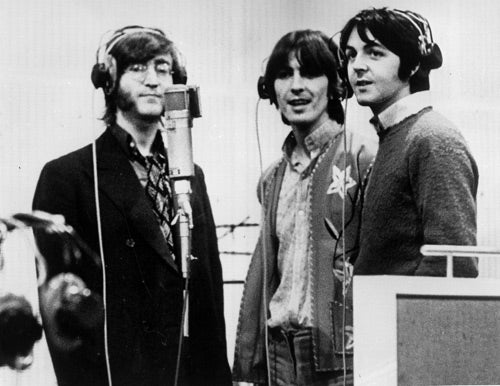Israel lets it be – with apology for banning Beatles 43 years ago

Your support helps us to tell the story
From reproductive rights to climate change to Big Tech, The Independent is on the ground when the story is developing. Whether it's investigating the financials of Elon Musk's pro-Trump PAC or producing our latest documentary, 'The A Word', which shines a light on the American women fighting for reproductive rights, we know how important it is to parse out the facts from the messaging.
At such a critical moment in US history, we need reporters on the ground. Your donation allows us to keep sending journalists to speak to both sides of the story.
The Independent is trusted by Americans across the entire political spectrum. And unlike many other quality news outlets, we choose not to lock Americans out of our reporting and analysis with paywalls. We believe quality journalism should be available to everyone, paid for by those who can afford it.
Your support makes all the difference.It has been a long and winding road, but Israel has at last apologised to the surviving Beatles for banning them from the country in the 1960s as a supposed threat to the morals of the nation's youth.
Visiting the Beatles museum in Liverpool yesterday, the Israeli ambassador to Britain, Ron Prosor, handed a letter of apology to Julia Baird, sister of the late John Lennon, expressing regret over the snub of 1965. Mr Prosor, one of Israel's most senior and long-serving diplomats, was seven years old when the "misunderstanding" took place.
The two surviving Beatles, Sir Paul McCartney, 65, and Ringo Starr, 67, are now expected to join celebrations in May of the 60th anniversary of the founding of the state of Israel.
Israel will also write to them and to the family of the late George Harrison in an attempt to smooth over any lingering embarrassment caused by the decision, made in the tense period before the Six-Day War. The letter says: "Unfortunately, the State of Israel cancelled your performance in the country due to lack of budget and because several politicians in the Knesset had believed at the time that your performance might corrupt the minds of the Israeli youth. There is no doubt that it was a great missed opportunity to prevent people like you, who shaped the minds of the generation, to come to Israel and perform."
The news, announced yesterday in the Israeli newspaper Yediot Ahronot, has left students of the 1960s rock scene bemused as to what on earth could have caused the ban in the first place.
In 1965, the Beatles were still in the first flush of international celebrity, when it seemed that they could do no wrong. Even the Daily Mail described them as the sort of boys you would like to have living next door. In that year, they were awarded MBEs and were received by the Queen; they toured the US, appearing on The Ed Sullivan Show, and had a string of chart-topping hits. (The revelation that they smoked dope in the lavatories at Buckingham Palace came later.) An Israeli entrepreneur named Yacov Ori learnt that they had a Jewish manager, Brian Epstein, and thought it would be a good idea to stage a Beatles concert in Tel Aviv. A deal was struck through Epstein's mother, Queenie, who had relatives in Israel. But the Beatles management in the UK took a hard-headed business line, demanding a fee deemed adequate for the new golden boys of world music.
According to Yarden Uriel, the Israeli author of two books about the Beatles, Israel was slow to realise the full force of the group's popularity. "When Beatlemania swept the world, Israel was like a side observer that didn't take part in the actual game," he said, adding that, because the country was short of foreign currency, Mr Ori couldn't get the foreign money to pay the Beatles.
He made an official application to a government committee, which was turned down on the basis, said Uriel, that "too many artists were invited to Israel anyway, and since they felt the band didn't stand on a high cultural and artistic level and had a bad influence over youth, the decision was made: no money should be given to the Beatles".
The committee that blocked the Beatles tour was answerable to the Israeli Ministry for Education, then headed by General Yaakov Schneider. His son, Yossi Sarid, a former member of the Knesset, said: "There is some kind of fable that my father prevented the Beatles from entering Israel. I tried to look into it and didn't find any evidence to support this. I decided, however, that it's a nice legend, so who am I to destroy it?
"I assume they told my father that the band members have long hair and take drugs, and will surely corrupt Israeli youth."
Join our commenting forum
Join thought-provoking conversations, follow other Independent readers and see their replies
Comments